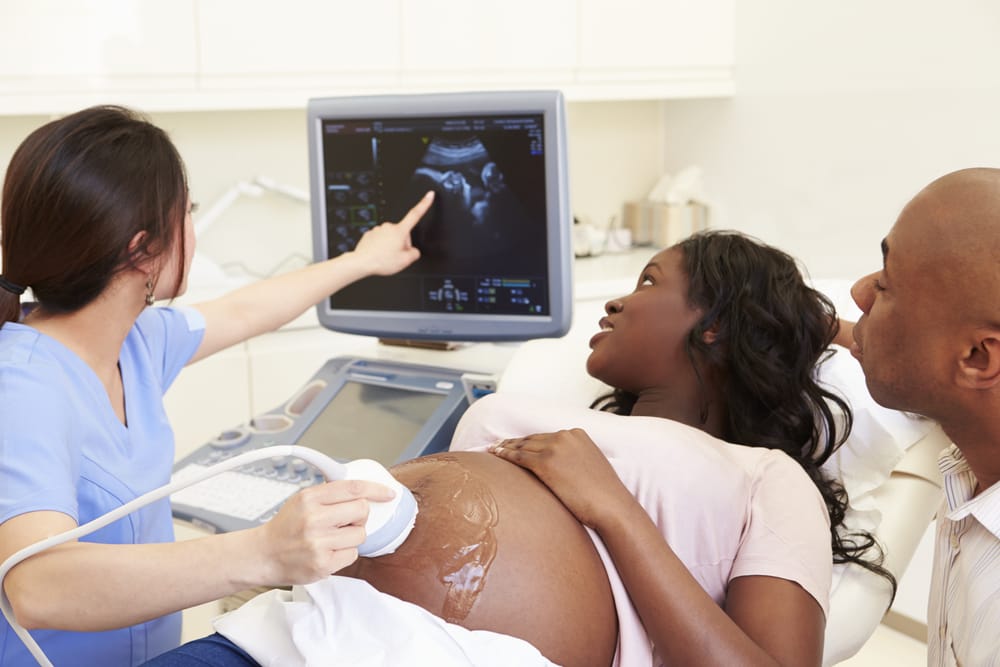The existence of racial disparities, inequality, and minority oppression is a tale as old as time. Despite societal advances, undertones of violence, bias, stigma, and discrimination continue to pervade the U.S. healthcare system. Even decisions that, on their face, do not appear discriminatory, can have disparate impacts on certain racial and ethnic groups and perpetuate existing health inequities. The recent decision by the U.S. Supreme Court to overturn the constitutional protection of abortion is predicted to have precisely this negative impact on Black mothers, who are already part of a stark and sobering maternal mortality crisis.
The Black Maternal Mortality Crisis
Each year, more than 700 people die during or within twelve months after pregnancy, and at least 50,000 women experience life-threatening complications from childbirth that result in serious health consequences. Notably, Black women are up to three times more likely to die from a pregnancy-related cause or complication than Caucasian women. This risk spans income and education levels and makes Black women the most likely racial group to experience maternal health complications throughout their pregnancies. With rates of maternal death rising, it’s important to understand three of the key factors that fuel this racial gap in maternal healthcare.
First, due in part to racism and sexism, Black women have lower earning potentials than Caucasian men, making, on average 63 cents for every dollar paid to Caucasian men. This type of income inequality means that Black women may have less money to spend on healthcare and may experience greater financial barriers to accessing the care they need. Specifically, as compared to Caucasian women, Black women are more likely to be uninsured and, in states that have not expanded Medicaid coverage, many Black women fall into the coverage gap. Black women who reside in states that have not expanded Medicaid coverage experience a greater number of maternal deaths that those who reside in Medicaid expansion states.
Further, the lack of health insurance means that Black women will have less access to quality healthcare and be less likely to access prenatal care. Faced with limited healthcare access, many Black mothers have underlying conditions that can complicate their pregnancies – such as obesity, diabetes, and hypertension. Black mothers are also more likely than Caucasian mothers to experience preventable diseases and chronic health conditions and are more likely to suffer from pregnancy complications such as preeclampsia. Deprivation of prenatal care can further result in premature birth, low weight at birth, and increased maternal and child mortality rates. Statistics show that children of mothers who do not access prenatal care are three times more likely to have low birth rates and five times more likely to die than children of mothers who accessed prenatal care.
Second, Black women may place less trust in medical professionals and are more likely to actively distrust the medical system than White mothers. The medical profession has a reputation for experimenting on Black men and women and pressuring Black women to limit their family sizes through contraception and forcible sterilization. When interacting with medical professionals, Black patients reported frequently having their complaints and symptoms dismissed or disregarded, interacting with condescending and dismissive clinicians, and not being referred for specialty care as frequently as their Caucasian counterparts. One study reported that 22% of Black women encounter discrimination when visiting a doctor or clinic.
Even Black celebrities have been dismissed by their healthcare providers before and after labor. In a well-known example, Serena Williams inquired as to whether she should be placed on blood thinners following her C-section, as she had a history of blood clots. Nurses dismissed her request even though Williams experienced excruciating pain and could not move her legs or back. Williams had to press for a CAT scan of her lungs and to be put on heparin, with scans later showing that she was experiencing an embolism. Like Williams, many Black mothers are left to advocate for themselves, and some are not taken seriously by their healthcare providers, with detrimental consequences following. As a result, pregnancy complications are the sixth leading cause of death among Black women ages 20 to 44, while pregnancy complications do not even crack the top 10 causes of death for any group of Caucasian women. Preeclampsia, eclampsia, and embolism are leading causes of death among Black mothers.
Third, Black women are more likely to give birth at hospitals that predominantly serve Black communities. Statistics show that approximately 75% of Black women will give birth at one of these hospitals. Hospitals that predominantly serve Black communities are known for providing lower quality maternal care and perform worse than other hospitals on 12 out of 15 birth outcomes, which include elective deliveries and maternal mortality.
The Impact of Dobbs on Maternal Mortality
The maternal mortality crisis is anticipated to worsen following the Supreme Court’s decision in Dobbs v. Jackson Women’s Health Organization. In Dobbs, the Supreme Court overturned the foundation of Roe v. Wade and held that abortion was not a constitutionally protected right. Reversing nearly 50 years of precedent, the Supreme Court returned the decision on abortion to the states. As a result of this decision, 26 states are certain or likely to ban abortion, with 13 states having “trigger laws” on the books that ban or restrict abortion either automatically or by short state action following the overturn of Roe v. Wade. Many of the states with trigger laws are in the South (e.g., Arkansas, Kentucky, Louisiana, Mississippi, Oklahoma, Tennessee, and Texas), where almost half of the Black population in the U.S. resides.
Limited abortion access is predicted to jeopardize women’s health and exacerbate maternal mortality rates. A study published in the American Journal of Public Health noted that states with abortion limitations in 2015 experienced a 7% increase in maternal mortality from 2015 to 2018 than states that offered greater access to abortion. That same study found that women who were denied abortions were more likely to experience negative health consequences as a result of being forced to carry the baby to term, including preeclampsia, postpartum hemorrhage, and depression. Further, even before the Dobbs decision, the states with the most restrictive abortion laws also had the worst maternal health outcomes.
With many states now restricting abortion access, or banning abortions altogether, Black women – especially those with low income – will be most at risk for negative health and socioeconomic consequences that result from the Dobbs decision. A 2020 study showed that the abortion rate for Black women is nearly four times higher than the abortion rate for Caucasian women, making Black women the largest demographic of abortion seekers in the United States. 2019 data from the Centers for Disease Control and Prevention showed that Black women comprise 38.4% of abortion patients. In Texas, for example, which has already implemented restrictive abortion laws following Dobbs, Black women are five to six times more likely to obtain an abortion that White or Hispanic women. Similarly, in Mississippi, Black women obtained 74% of abortions provided within the state in 2019. Experts estimate that full abortion bans could increase Black maternal deaths by at least 33%, compared to a 21% increase for the overall population.
For Black women forced to endure unwanted, unsafe, or traumatizing pregnancies, the long-term effects extend beyond healthcare. It is anticipated that abortion restrictions will continue to trap women in a cycle of poverty and disadvantage and increase financial distress. Statistics show that Black women are almost twice as likely as Caucasian women to be sole breadwinners in their families, and nearly one in four Black women live in poverty. The poverty rate for Blacks has been roughly one-third higher than the poverty rate for Caucasians for more than 30 years. Further, states that have enacted abortion restrictions are less likely to have parental support laws and policies, further harming Black mothers. This means that Black women will be disproportionately impacted by states that restrict or ban abortions, resulting in another form of inequality and oppression.
Responding to the Crisis: Strategies for an Uncertain Future
Given the exacerbation of the maternal mortality crisis for Black women in the wake of Dobbs, action is necessary to curb the rising mortality rates. Recognizing the deteriorating conditions for Black mothers, the White House released its Blueprint for Addressing the Maternal Health Crisis (“Blueprint”) in June 2022. The Blueprint calls for Congress to close the Medicaid coverage gap and help the 4 million Americans who live in Medicaid non-expansion states. The goal is to increase women’s access to and coverage of comprehensive maternal healthcare services, including behavioral health services. The Blueprint further advocates for clinicians to listen to their patients and to hold clinical decisionmakers accountable for their systems of care. As part of this, expansion and diversification of the perinatal workforce is crucial. In addition, the Blueprint seeks to promote data collection and transparency with respect to maternal health and to strengthen economic and social supports before, during, and after pregnancy.
While the Blueprint serves as official recognition of the maternal health crisis and outlines potential paths forward, it does not impose immediate changes. This is due, at least in part, to the complexity surrounding the maternal health crisis and the recognition that a quick solution does not exist, nor is mitigation of the crisis that simple. To fully address the maternal health crisis, there must be a conscious societal effort to break down barriers and stigmas that disadvantage women and, in particular, Black mothers. Gender and racial equality, pay equity, and equal access to healthcare and education are among the key principles that must be achieved to fully address the maternal mortality crisis. This is a long road to travel, and one that will require deliberate policies and activism to pave successfully.
In addition to the longer-term solutions that are necessary to address the maternal mortality crisis, shorter-term solutions are also being devised. For example, numerous employers have publicly committed to providing abortion travel benefits to their workforce for women who need to travel out of state to obtain abortion care. These travel funds will help women access crucial healthcare across state borders, which may otherwise be cost prohibitive. For many Black women living and working in the southern United States, interstate travel is not feasible, given the lengthy drives, time off work, and cost to travel. One estimate suggests that women in southern states may need to drive six times as far, on average, to terminate a pregnancy if they live in an abortion-restricted state. Given the higher poverty rates for Black mothers, studies suggest that Black women will be less likely to have the financial means to afford out-of-state travel on their own for abortions. A 2017 survey found that 4 in 10 Black women between the ages of 18 to 44 could not afford more than $10 for birth control, suggesting that they are less likely to have excess cash on hand that can be used for interstate abortion travel. Thus, employer abortion benefits may serve an important interim function in helping women in abortion-restricted states access reproductive healthcare.
Finally, the female health technology (“femtech”) industry is also stepping up to address inequities in access to care. The growing femtech industry is poised to offer digital access to maternal healthcare, particularly for women who may not otherwise be able to obtain such care in person. As the femtech industry continues to evolve, it will likely deliver health technology solutions that can bridge the gap in care access for women residing in abortion-restricted states. Femtech solutions that include prenatal wellness, postpartum health monitoring and tracking, and maternal telehealth are already in the works or on the market today, with new innovations on the horizon.
Conclusion
While the maternal mortality crisis is not new, the impact of the Dobbs decision is expected to worsen access to reproductive healthcare for women – especially Black women. Abortion-restrictive policies correlate strongly with worse healthcare outcomes for mothers, and the continued passage of abortion bans is anticipated to increase maternal mortality rates. Immediate and long-term actions are necessary to reverse the mortality trends and value women’s lives.

Bethany Corbin, Esq.
Bethany Corbin, senior counsel at Nixon Gwilt Law, is a healthcare innovation, femtech, and privacy attorney. She empowers femtech and healthcare innovation companies to achieve their goals with legal and strategic guidance. She is CIPP/US certified and has a healthcare LL.M. She can be reached on LinkedIn.








